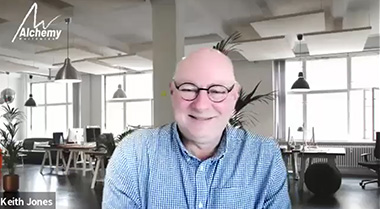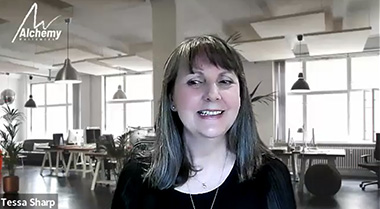
News by ICMCI in Skills of Tomorrow
In an online session on 8 April 2022 as part of the ICMCI Future of Management Consultancy initiative, Keith Jones and Tessa Sharp, co-founders of Alchemy Worldwide and co-authors of the book PROVOKE: The Art of Transformative Facilitation, a finalist in the best business book awards 2020, brought to the fore the developmental approach and how it can take management consulting into the future.
Since the 1990s, they have been involved in the development of consultants not just within Big 4 consultancies and strategy houses, but also across a multitude of different sectors from financial services, pharmaceuticals, the public sector with internal business partners and freelancers, and it is peculiar that they all have slightly different agendas for the development of consultants.
The developmental approach shows that, ultimately, the relationship which sits at the centre of the consulting paradigm very often comes back as being a fixed paradigm and it becomes organised by the parameters of what people, or the industry, or the particular area define as regards the consulting relationship.
Still, common aspects of skill development emerge irrespective of the level of practitioner, of industry or of where one chooses to focus their efforts:
- The relational patterns between consultants and clients tend to be fixed: there are certain language patterns which are repeated irrespective of the level of seniority of the consultant.
- Rupture in the relationship due to the immaturity of the consultant to navigate the relational paradigm.
- The consultant’s personality and self-identity can be very powerful: not only in developing the relationship but also in advancing the role of the consultant in the organisation itself.
- The mind-set it critical: how consultants formulate the way they present themselves in the consulting relationships.
A particular conclusion is that a successful relationship is not based just on trust. What is also important is how the relationship has evolved together with the multitude of other relationships which are necessary to develop the fundamental consulting relationship.
Consulting is affected by a number of global emerging trends:
- Internet of Things and Artificial Intelligence will render many technical consulting areas of expertise redundant.
- Much knowledge, data and information is freely available on the internet: the consultant is no longer in the position where “knowledge is power”.
- Change in client organisations is happening fast; clients are often: time poor; overloaded with data; limited in time to reflect; looking for instant solutions to new and unfamiliar challenges; many of which are unsolvable.
- Consultants need to have a learning attitude.
From a consultant’s point of view, what matters is the ability to migrate from a “solver of problems” to somebody who can embrace both the problem and solution paradigm, and the polarity of where the problems cease to be issues to be solved but more attention to be managed.
Also essential is the speed with which change happens. Consultants new to be broadly read enough to understand the complex environment.
Consultants have always needed to be flexible and able to adapt to a variety of different client situations and personalities. Now it is even more critical for them to be able to differentiate their value as human beings; unique beyond the boundaries of their technical field and expertise. Thus, consultants need to be able to support clients both personally and technically in unknown, unchartered territories. To do this, consultants need to understand and to leverage the potential within themselves to access the unique value they bring in support of their clients.
According to research, consultants are good at: managing and performing tasks; handling the financial and commercial aspect; as well as ensuring the necessary technical expertise and compliance. Less strength is observed as regards: relationships and the maturity of knowing when and how to optimise their presence; process in terms of orientation and hypothesising about option; and context
The key for consultants lies in the effective use of self: constantly learning; being curious and reflective; hypothesising; exploring; being comfortable with ambiguity.
In the use of self, it is possible to distinguish between:
- What happens “on the inside” which is part of one’s deep personal landscape: self-knowledge and self-belief; sense of self-identity; interpretation and meaning-making; openness to learn; resilience, empathy and ability to calm
- What happens “on the outside”: how consultants present themselves; what they say; the actions they take.
Furthermore, it is important to recognise and benefit from different types of intelligence such as spiritual, intelligent, emotional and somatic.
Thus, consultants have available to them five ways of relating:
- Formal: detached; impersonal; authentic self-hidden; professionally masked
- Shared: built over time and experience together; common understanding; intuiting; common shared purpose
- Person-to-person: confident; human; genuinely friendly; flexible; interested and interesting
- Developmental: learning from each other; working it out together; sharing and building on each others’ ideas;
- Imagined: heard from others and taken as fact; fantasised/imagined; possibly real/possibly not real; assumed and unvalidated.
For highlights of the event, please check out this video and presentation.
About Keith Jones and Tessa Sharp
Keith Jones and Tessa Sharp are co-founders of Alchemy Worldwide and co-authors of the book PROVOKE: The Art of Transformative Facilitation, a finalist in the best business book awards 2020.

Keith Jones he has been involved with the development of consultants from all industry sectors over the past 30 years. He has held senior roles within KPMG as Director for Learning and Organisation Development and within business psychology consultancies as Director of Learning within the UK. He has worked in over 45 countries and holds a strong adherence to the principles of experiential learning and sustainable impact.
Keith Jones is CMC, MSc, CTA(C), DipTAPsych, Dip. Org Gestalt, NLP MasterPrac NLP Trainer, AoC, FIMC, Professional member AHPsych/ATPsych.

Tessa Sharp has worked with a multitude of senior business leaders in over 35 countries and is well versed in the tough challenges and complex issues they face. She is a highly experienced executive facilitator and coach. The majority of her current work is focused on senior and executive teams in realising potential and overcoming blocks to change – in themselves as individuals, as a leadership team and across their organisation.
Thessa Sharp is MSc NLP MasterPrac NLP Trainer Dip. Org Gestalt AoC, AHPP Cert. OD (NTL), Professional member AHPsych/ATPsych.
About the ICMCI Future Leaders Forum
Combining a series of events, discussions and publications, the ICMCI Future of Management Consultancy initiative strives to promote the global conversation about the future of the profession towards developing a common vision to help and inspire consultants all over the world.
Designed as an “open source” and inclusive platform, the Future of Management Consultancy is an opportunity to seek answers to pressing questions and to encourage interactive communication and joint idea generation.






